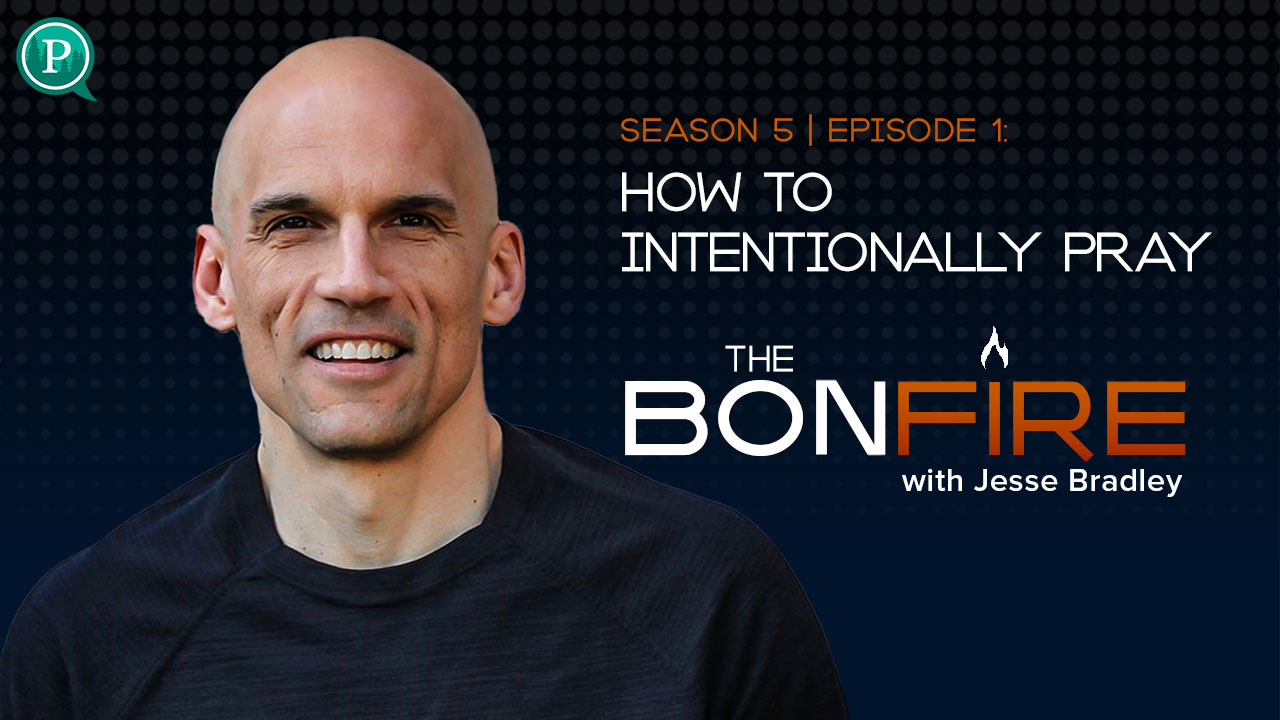How do we make intentional prayer a part of our faith walk? Today Pastor Jesse looks in the book of Exodus to discover how Moses prayed. Prayer helps us grow our relationship with God. Let’s all get started in cultivating daily prayer!
Find Pastor Jesse: Online | Facebook | Instagram | Twitter
If this resonates with you, please rate, review, and subscribe where you listen to podcasts. For updates follow me @jessejbradley on all socials and for the latest videos check out my YouTube channel Jesse Bradley. The best is yet to come!
Special thanks to World Concern for sponsoring The Bonfire Podcast.
Transcription:
Jesse Bradley:
Welcome to The Bonfire. This is a podcast that focuses on God’s presence. God is love, God is light, God is a consuming fire, and this is season five. We are growing together in our faith. Thanks so much for watching and listening, for sharing this with friends and family. We’re building up each other, and most of all, we’re meeting God in deep ways. God is the one who transforms our life. His love is nothing that compares to it. And in this season, season five, we’re going to focus on prayer. And I share this because for me personally, it’s an area I want to continually grow in this area of prayer. I don’t know anyone that thinks they’ve arrived when it comes to prayer. I don’t know anyone who thinks they’ve got it all figured out. This is an area of life where we really need to dive into scripture, and then make some shifts, and seek God intentionally together. As we talk about prayer, I want to start out today with the message it’s time to pray.
It’s time to pray. You see that throughout scripture where God will communicate that to someone. It’s time to pray. There’s a call to prayer. And I sense that as I look around the world right now in all the different situations locally, nationally, globally, it’s time to pray. And then from scripture, we see when we pray, God hears. When we pray, God moves. When we pray, we’re drawing closer to God. We’re relying on God. We can’t solve our problems with just human solutions and human strength. We need supernatural help. God is our refuge strength and ever-present help in trouble. He hears our prayers, he cares. And with God, there’s no limits to how he’s going to answer our prayers and show up and guide us, and we trust him. That’s at the core of prayer, is trust.
And today, I want to look at Exodus chapter 17, and I want these next seven episodes to be times where we get into God’s word and we really move forward in our prayer lives in different aspects of prayer. Prayer is kind of simple in one sense, it’s a cry to God, it’s communication with God. It’s both listening and also pouring out your heart. It includes adoration and confession and thanksgiving and supplication, bringing your requests to God. And beyond that, there’s different levels with prayer. There’s different levels of what happens emotionally and physically in our lives and relationally and spiritually. There’s different ways that the ripple effects of our prayers go out into our homes and where we live, work, learn, or play. And even around the world, we don’t physically travel to another country, but our prayers travel there. So much happens in prayer. I hope that you get just an excitement to pray.
And let me tell you, when it comes to a bonfire, prayer is the lighter fluid. Prayer is the lighter fluid in our spiritual lives. Prayer is essential. It’s not one of those things that’s optional. There’s a lot of options in life like, “Oh, I could have this kind of car,” or, “We could paint the house this color.” There’s all kinds of decisions we make during the week related to optional aspects of life. Prayer is essential. Prayer is at the core of your relationship with God. Every good relationship comes down to trust, communication, closeness, and that’s what happens in prayer. So today, let’s let it sink in that it’s time to pray. Don’t make excuses, don’t resist that, don’t fight that, but instead embrace it, that heaven is sending in a catalytic way, in an empowering way, a message to you today. God is saying to you today, “It’s time to pray.”
And in a country like America where there’s a lot of prosperity, there’s a lot of entertainment, we have all kinds of technology and there’s a lot of methods. We love our ideas, our education, our rational thinking. All those things exist in America, but sometimes those blessings can hinder our prayer life, and we want to break through with prayer. This is time for a breakthrough. It’s time to pray. That’s clear in Exodus chapter 17, and we’re looking at Moses’s life. Moses became a man of prayer. You really didn’t at the start think that that would be his path. The first 40 years of Moses’s life, it really culminates in Moses killing someone. Moses is a man of action. He’s someone that has a lot of passion, even good intentions. He wanted to see the slaves set free, but he tried to do it in his own strength. When we don’t pray, we do things our own way with our timing, and we rely on our own strength. And what happens as a result? Like Moses, he ended up spending 40 years in the wilderness.
If you’ve ever just tried to call your own shots and grab the steering wheel and say, “I’m the captain of my life. I’m the captain of the ship, I’m going to take it to where I want to go. It’s going to be done my way,” life will humble you, and you’ll realize maybe there’s a better way. And Moses learns this because he becomes a man of prayer. And it’s been said the first 40 years of Moses’s life, he want to do it his way. And then he realized there was failure and he messed up. And so the next 40 years he’s really thinking, “No way. No way does God still want to work in me and through me. And there’s no way I’m going to say yes to God.” He builds up excuses and walls. Maybe you have some walls with God that need to come down. And in the last 40 years, he decides it’s going to be done God’s way. And God’s way includes prayer.
Now in Exodus chapter 17, there’s a tense situation. There’s a battle. You might feel like you’re in a battle relationally, financially, physically or spiritually. Battles come. There’s an attack. The Amalekites show up and it’s unexpected. Although the Amalekites will really be a thorn in the flesh of the Israelites. And the Amalekites show up and they want to attack, there’s an enemy that wants to steal, kill and destroy. They attacked Israel. This is real. They want to wipe people out. Moses then has to come up with a plan. As the leader, you can’t be passive. You have to be proactive. You have to come up with a plan. So he says, “Joshua, you engage in the battle, because we need the protection. We need to activate the military, and this is what I’m going to do, Joshua. I’m going to go to the top of the hill. I’m going to take that staff with me that God has given to me, and I’m going to lift up my hands and pray.” Moses is intentional, prayer is intentional.
There’s three things I want to highlight today. The first one, prayer is intentional. If you don’t focus on prayer, it’s probably not going to happen. If you don’t prioritize in value prayer, it’s probably not going to happen. If you don’t guard time in your schedule, it’s probably not going to happen. Moses is going to a specific place to pray. I encourage you, find a specific place. Now you can pray in every place you go, but at the same time, it’s good to find a specific place where you kind of know this is my prayer place. This is where I like to meet with God. And Moses goes to the top of that hill to pray, to rely on God, to call on God. And he knows there’s a battle happening as Joshua’s going to be fighting the Amalekites. He’s intentional with prayer.
The Bible says it’s God’s will for us to pray. And that kind of prayer, as Jesus taught his disciples how to pray, they asked him, “Could you teach us how to pray? We’re not very good at prayer. We need to learn how to pray.” Jesus taught them. He was intentional. He not only taught them with his words but with his actions. Early in the morning, Jesus would find a place where he could be alone, away from the needs and the crowds and the to-do list and the demands. He would get alone with the Father, listen to the Father, receive direction from the Father. The Bible says, “If you don’t ask, you’re not going to receive.”
God will open up the floodgates of heaven. He will pour out blessings. But you need to be in a position where you say, “God, I’m listening. You have my attention. You have my devotion. God, you have my affection. I’m going to receive first,” because if we don’t receive, we don’t have anything to give. If you don’t receive hope from God, you don’t have any hope to give. If you don’t receive love, if you don’t receive his word, if you don’t receive from God, there’s no overflow, and that’s not a good feeling to be running on empty. So take time to pray. Intentionally pray. Guard that priority in your schedule. If you have roommates or if you have family members, if you don’t live alone, you live with other people, set up a time to pray. Do that by faith with your life group or your Bible study group. Set up a time to pray. Sunday mornings, be intentional to pray. Go to church on Sundays and then pray.
It’s important to have intentional prayer during the week. Prayer is not going to happen unless it’s intentional. I’m saying that’s a hard thing for me to do, and I’m a pastor, is to be intentional around prayer. There’s a hundred other things I could do every day. And usually those are the loudest. No one’s coming to me saying, “Jesse, make sure you pray. Jesse, guard your prayer time.” Instead, everyone else saying, “Could you do this? Could you send this? I need you over here.” And so there’s going to be a hundred requests, and none of them have anything to do with prayer. That’s why you have to have a conviction. You have to be the one who owns this and says, “This is what I want it to look like, my relationship with God.” And for such a time as this, understanding the times we’re in, what could we do but pray?
Moses knows the Amalekites are coming, the battle’s on, and it’s time to pray. I believe there’s a battle in our country right now between good and evil, light and darkness, between God and the devil. I believe you’re seeing it played out in so many arenas, so many different areas, so many homes, so many churches right now. There is no question, a battle is on. A battle is on in Exodus chapter 17. So Joshua engages one way, and he’s going to be faithful in the military. But then also Moses is going to be faithful when it comes to prayer. Be intentional with prayer just like you see here in Exodus chapter 17.
Now the next part is that prayer is relational, and this is on two levels. It’s relational with God, and then also it’s relational because you pray for other people, and you pray with other people. Moses goes to the top of the hill. And then we have Aaron and Hur who accompany him. Aaron and Hur because Moses is going to be lifting up his hands in prayer, and he’s going to get tired. Sometimes we get tired in prayer. Jesus told the disciples, “Stay awake. Don’t fall asleep. Watch, pray. The spirit is willing. The flesh is weak.” All of us, we want to give up in prayer. We get tired when it comes to prayer. We get worn out when it comes to prayer. Prayer is work. Sometimes; it really is. Sometimes it just flows out naturally. And then other times, it feels like you’re laboring. It’s a good labor. Laboring in the Lord, it’s not in vain, but there’s an intercession. There’s a travailing in prayer. There’s a perseverance in prayer.
And Moses feels this. He feels this physically. Whenever his arms are lifted up in prayer, they’re prevailing below. They’re winning the battle. And yet when his arms start to drop, they start losing the battle. This is not coincidence. Prayers, his arms are up, the battle, God is intervening and winning. But when we stop relying on God, when we give up, when we stop, it’s symbolic. What a powerful picture. We stop praying, and the enemy starts to take over. Don’t stop praying. Prayer is relational. And Moses, yes, they put a stone there because he’s going to need to sit down sometimes and rest. But Aaron and Hur holding up his arms, this is raw. This is messy. It’s probably smelly. Moses’s arms are lifted up all day long. Aaron and Hur are right there. And yet together as a team, they’re praying. Find some people who will pray with you. It could be friends, could be people from your church, could be on the phone.
You probably have a few people in your life that would gladly pray with you. And if you said to them, “Hey, I want to pray with you a little more often,” they’d probably say yes. Some people are going to be excited because they’ve been waiting. Who else wants to pray? And when we’re alone, we sometimes just run out of steam. But when we pray together, okay, you’re praying, I’m praying, we guarded this time to pray. Find some people who pray. Embers fade when they’re alone, but when you bring the embers together, there’s a bonfire. Same is true with prayer. Prayer is so good alone. It is so important alone. And for some of you, that’s where you’re going to naturally pray the most is praying alone. And I encourage that. I’m cheering you on. At the same time, we need both prayer alone and praying with people. It’s me, and it’s also we.
In the Western culture, in especially western part of the United States, a lot of independence, a lot of individualism. Sometimes that can be beneficial. But on the flip side, what’s the downside? We miss out on relationships. We miss out on community. We miss out on participating together in things like prayer. And it just isn’t as common to say, “Let’s pray together.” So as we pray, find some people. Moses and Hur, they’re going to join. Aaron’s there; they’re praying. Prayer is relational. Pray not only for other people, but with other people. And they’re praying to God who is the God of hope. He’s the God of Abraham, Isaac, and Jacob. He’s the great I am. He has the final say. He’s over nations. He’s more powerful than any military. They know who they’re praying to. We come to God. He is a throne of grace. He is on the throne. God is not running out of strength. He’s not running out of wisdom. He’s not running out of guidance. He’s not running out of anything.
And when we come to God, we draw close to God. This is not a formula in prayer. This is not a cosmic vending machine. God is not an impersonal force. God is compassionate. God hears, God cares, God moves. Prayer is about God. Prayer is powerful. Yes, the Bible says that, but it’s only powerful because God is powerful. Prayer is the instrument that God chooses to work through. Prayer is how we communicate to God that we can’t do it alone. Prayer is how we communicate, “We need your help, God.” We rely on God. When we pray, God gets all the glory because we know we’re saying to God, “God, could you come in and do what we can’t do?” And when God does it, we know it wasn’t us; it was God.
If you put your trust in Jesus, you have a relationship with God that no one can take away for eternity. And that relationship stands because it’s a covenant relationship. Christ has paid for your sins. He’s risen from the grave. If you’ve never made that decision, make that because it’s the best decision you’ll ever choose. Now in that relationship with God, there’s going to be fluctuation. And sometimes you’re going to be closer, sometimes you’re going to drift. When you pray, you come closer, you come home, you return to God. There’s no better way to return to God than through prayer. Return to God in prayer, and it’s the relationship. Draw near to God and he will draw near to you. That’s a promise in Scripture. It’s a wonderful promise.
Don’t drift and stay away. Don’t live in the land of isolation or shame or guilt or fear or selfishness, limiting beliefs. Don’t live in that land, but return to God. And as you draw close to God, there’s going to be a connection. This relationship is deeper and more powerful than any other relationship. If you’re always going to humans, you’re only going to have human help. And that’s important. I mean, God works through people. There’s no question. God talks through people, brings love through people. But where you really need help is from God, heavenly help, supernatural help. God has help that no one can stop. No one can stop. And in this passage right here, as they rely on God, Moses, Aaron, and Hur are relational with God. Relationally, they’re praying together as a team. Find a prayer team. Pray, cry out, and God prevails. God protects the people. God preserves his people, and there’s provision from God. And in this battle, Joshua is going to prevail. It’s not just human effort. This is the hand of God. And because God is mighty, if God is for us, who can be against us?
For generations, children and families in the poorest places in the world have struggled to find clean water, food, and a chance for a brighter future. But all that can change in this generation. You can be part of the solution. Go to worldconcern.org. As you participate, this is what will happen. Villages will be transformed far beyond where the road ends, and children and families will receive the love of Christ. You can make a difference. Go to worldconcern.org. Let’s be part of the solution together.
Notice there was intentional prayer. That’s one of the best decisions in the world. And then after that, prayer is relational, and we see it lived out here. And then finally, prayer is continual. When they win the battle, what do we read? Moses built an altar, called it the Lord is my banner for hands were lifted up to the throne of a Lord. Prayer was continual That whole day, and I look at our church and we’ve had this anthem, abiding and respond from John chapter 15. You abide with Jesus, you’re going to bear much fruit.
Abiding is continual. It’s that drawing near. And abiding and prayer go together. You draw near to God, you listen, you rely, you trust, you submit and surrender. And as you do that, Jesus is going to work in you and through you, and there’s going to be incredible fruit. Abide and respond. Abiding’s continual. Sometimes we want to compartmentalize abiding to just one hour, one place. These are the places I’m spiritual. These are the places where I pray. Well, actually, you can pray anywhere. I remember talking to someone who’d been a Christian for a long time and I said, “Let’s pray right here.” And they looked around, because we were in public. We were just on a street corner. They said, “Pray right here?” And I said, “Yeah, we don’t need to be in a church to pray. Prayer is continual.” And yet there are times where it’s more focused and you get bigger groups together to repent, to worship, to thank God. That is part of a prayer rhythm during the week.
But prayer is continual. Prayer is that abiding. Prayer is that connecting. Prayer is that communicating. I encourage you to spend a lot of time listening to God. Listen to God when you pray. Yes, you’re going to share what’s on your heart. You’re going to give God your burdens. You’re going to turn from sin to the Savior, but also listen to God. As you’re praying and receiving and listening, it becomes continual. It’s kind of like you’re breathing. There’s no moment of the day where you’re not breathing. It’s continual. Your heartbeat is continual. Blood is flowing through your veins. It’s continual. God has set up our bodies with many systems, and those systems are continually working. You have a skeletal system as you move, you have a respiratory system, you have a blood flow system, and these systems are continual, and they’re a picture. Just like breathing is essential, we need prayer in our spiritual life. It’s continual.
And there’s a continual, “God, what do you want me to do? God, what are you saying? God, how should I respond right here?” People who stop praying, they get in the flesh instead of being in the spirit. So they just react. They do whatever they want to do. They form their own plans. They’re doing things and saying, “God, come bless it.” But when you pray, there’s a surrender, there’s this listening. And as you’re praying, you’re praying for other people during the day. Prayer’s like a muscle. If you first go to the gym and you get on the treadmill and you haven’t been on the treadmill, you haven’t been running in two years, it’s going to feel like a stretch. It’s a good thing to feel stretched in prayer. It’s a good thing to feel stretched in fasting.
You want to build up that capacity, and God’s going to do that in you. And then as you start to pray more, prayer begets prayer because the more you pray, it’s like that muscle you’re strengthening. And then you see God answering more prayer. There’s some spiritual momentum. And you’re around people who pray, it becomes a culture of prayer. There’s some churches where you go there and you feel like is there any prayer happening? And then there’s other churches where you step in, you just feel it’s prayerful. There’s a culture of prayer. There’s a community of prayer. How does that happen? God moves in hearts. People start to pray intentionally. Pray with one another relationally, and then prayer becomes more continuous. There’s different places across America where there’s 24/7 prayer, and that’s another version of continual prayer. It’s another picture. And when you think about images of prayer in the Bible like that incense that’s rising up, the prayers going up to heaven, prayers that are moving God’s heart.
I don’t understand it all. There’s a mystery there. I don’t know how our words and our connection with God plays into situations and God determining different things. There’s a mystery there. But at the same time, it is a beautiful mystery. And the clear part for us is that God has called us to pray. It’s time to pray. And as we pray alone and with other people, I’m emphasizing with other people because you see it here in Exodus Chapter 17, as we pray, there’s a closeness that happens with God. There’s a closeness that happens when families pray. When a couple prays, something happens in the marriage. There’s that cord of three strands; it’s not easily broken. And when two people will humble themselves and pray, there’s restoration, that humility that comes out of prayer. Prayer is connected to action.
When you start to pray for your community, what’s going to happen? God’s going to open doors. You’re going to use your gifts and talents. You’re going to reach people. You’re going to invite people to church. You’re going to share your story. Prayer leads to action. Prayer is vital. Prayer is active, and it’s connected to a lot of different aspects. And Moses knows at the end of this battle, he says, “The Lord is my banner.” It’s almost like he’s making it clear. “Joshua, I know your team was valiant. I know your team fought hard. I know your team risked your lives, but let me just say, Joshua, this is the Lord’s victory. The Lord is our banner. The Lord gets the glory. The Lord showed up. We built an altar to the Lord, and we’re so grateful for his presence, his power. Without God, the Amalekites would’ve wiped us out. But because of God, we stand today. We stand strong as we’ve been praying, as we’ve been battling.”
Just because they pray, it doesn’t mean there’s no battle. It’s a both/and. And in your life, it’s a both/and. Keep an eye on both. Look at the things you’re doing and where you’re investing your time and energy, look at the battles you’re in, and also look at your prayer life and look who’s praying with you, and strengthen both. Get training in your skills. Learn more, get more experience. Take some good risks. And at the same time, build up your prayer life. For most people, they’re people of action and they just want to do. Let me tell you, human strength is not going to get it done. The things we really want to see in our nation, in our homes, it’s not going to be done just by effort and might. It’s going to be done by God’s spirit. It’s going to be done in prayer. It’s time to pray.
Moses has learned this. If you went back a couple decades, Moses wouldn’t have had that posture. He would’ve been like, “Let’s all fight.” But at this point, he’s learned, “We need to pray. We need to pray in this battle. The battle belongs to God. Our confidence is in God. We’re going to do everything we can do. At the same time, we can’t win this. We can’t win it alone. We need God’s help.” Are you convinced that you need God’s help to have peace of mind in your work to carry out the vision he’s called you? And then also in your church, in your city, do you see the need we have for God’s help? Once you see that, what do you do with that?
And I encourage you today, prayer and action. You’re probably already taking some action, but when you pray, that action’s going to get refined. It’s going to get more focused. You’re going to hone in, and you’re going to know what to do and not do. You’re going to separate what’s good from the best, the prayer and the action that go together. I encourage you to build up your prayer life. That’s where we want to go in this season of the bonfire, because there won’t be a spiritual bonfire without prayer. We need the Holy Spirit, and we need to pray. And sometimes, that’s the last thing we do. We wait until it’s a crisis. We wait until we’ve tried everything else. We wait until someone says, “It’s time to pray.” God says it clear to Moses, and because of his decision to pray, we are inspired to pray. As you start to pray more, there’s going to be others that are inspired to pray. This bonfire that gets built up, the prayers of a righteous person are powerful and effective, and what you do in prayer is not a waste of time. It does not just hit the ceiling and come down.
You’ll not look back and think, “Why did I ever pray? I think I’ve spent too much time in prayer.” That’s not going to be the case. I’m preaching to myself today, too, because I need to be reminded that time spent on our knees is time well spent. It is vital to what God is doing today. We’re in a battle. I think that’s undeniable. They’re in a battle in Exodus 17. Moses makes a wise decision to intentionally pray, to invite some people in to pray, and to see some victories as they continually pray. Don’t just pray a little bit and give up. God’s building endurance. He’s building capacity. He’s helping us to become more like Jesus. Look at how Jesus prayed. That’s how we want to grow. That’s how we want to pray. And Jesus is going to help us along the way.
Remember this: when you pray, God invites us to pray, there’s a throne of grace. We’re going to find mercy and help in our time of need. But we come to him in need, and we come to him, honest, humble. We come to him because we are not self-sufficient. We need God’s help. And as we cry out to God, God heals, God strengthens, God empowers. It’s time to pray.
Would you join me these next seven weeks? And as we go through this season, let’s grow in our prayer life together. Send me any comments about how you are intentionally praying, or who you’re praying with, or how you’re building up your prayer life in your relationship with God. And let’s journey together in scriptures and with God. God wants to fan the flame, that fire that he brings. We want to trust him. And I believe once you see the goodness of God, the response is to pray. Let’s pray, and God will win the battles. This is The Bonfire. Thank you so much for listening and watching today. We’re growing in our faith, and I encourage you to share this message with friends and family as we draw close to God together.
Follow this podcast:








